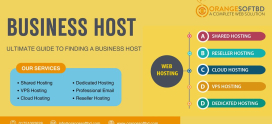
The Best Way To Create a Custom Hosting Package
Creating a custom hosting package involves tailoring hosting services to meet the specific needs of users, businesses, or projects. The best way to craft such a package is to thoroughly understand the requirements and preferences of your target audience.
Start by conducting market research and identifying common pain points or desired features within your niche. Once you have a clear understanding of user needs, design a hosting package that offers scalability, reliable performance, and essential features like sufficient storage, bandwidth, and security measures.
Regularly update and optimize the package based on user feedback and emerging industry trends to ensure it remains relevant and competitive in the dynamic hosting market. Additionally, providing excellent customer support can set your custom hosting package apart by addressing user concerns promptly and effectively.
Overall, a customer-centric approach, combined with adaptability and innovation, is key to creating the best custom hosting package for your target audience.
Understanding the Basics of Custom Hosting Packages
Custom hosting packages refer to tailored and personalized web hosting plans that cater to the specific needs and requirements of a website or business. Rather than opting for a standard or predefined hosting plan, users can work with a hosting provider to create a package that suits their unique demands. Here are the basics of understanding custom hosting packages:
Assessment of Requirements:
Before creating a custom hosting package, it’s essential to assess the specific requirements of your website or application. Consider factors such as website traffic, storage needs, bandwidth requirements, technical features, and any special software or configurations.
Resource Allocation:
Custom hosting allows for the allocation of resources based on individual needs. This includes disk space, CPU power, RAM, and other server resources. Resource allocation is critical to ensuring optimal performance for your website.
Scalability:
Custom hosting packages often offer scalability, allowing users to adjust resources as their needs evolve. This flexibility is particularly beneficial for growing websites that may experience increased traffic and demand for more resources over time.
Specialized Features:
Users can include specialized features in their custom hosting packages. For example, if your website requires specific software, security measures, or configurations, these can be incorporated into the hosting plan to meet your unique specifications.
Performance Optimization:
Tailoring hosting packages allows for performance optimization based on the type of website or application. This can involve fine-tuning server settings, implementing content delivery networks (CDNs), and optimizing databases to enhance overall performance.
Cost Considerations:
While custom hosting packages offer flexibility, it’s important to consider the cost implications. Customization may come with a higher price tag, so it’s crucial to strike a balance between meeting your requirements and staying within budget.
Custom hosting packages offer a personalized approach to web hosting, allowing users to tailor their hosting environment to meet specific requirements. This flexibility provides advantages in terms of resource allocation, scalability, specialized features, and performance optimization, but it’s crucial to carefully consider the associated costs and review the terms of the hosting arrangement.
Step By Steps Process to Create a Custom Hosting Package
Creating a custom hosting package involves configuring various settings and options to tailor the hosting environment to your specific needs. Below is a step-by-step process to create a custom hosting package:
Resource Allocation:
Specify the resources allocated to the package, including disk space, bandwidth, and the number of email accounts. This may vary depending on the type of hosting.
Set Limits and Restrictions:
Configure any limits or restrictions on the package, such as the number of domains, subdomains, databases, and FTP accounts allowed.
Choose Supported Features:
Enable or disable specific features like PHP version, MySQL/MariaDB databases, SSL support, and other technologies based on your requirements.
Customize Security Settings:
Configure security settings such as firewalls, antivirus, and other security measures to enhance the protection of the hosting package.
Email Configuration:
Set up email-related parameters, including the number of email accounts, mailbox size, and any additional features like spam filters and antivirus protection.
The specific steps may vary based on the hosting provider and control panel interface. Always refer to the documentation provided by your hosting company for detailed and accurate instructions.
Marketing Strategies for Your Custom Hosting Packages
Marketing your custom hosting packages effectively is crucial to attract customers and differentiate your services from competitors. Here are some marketing strategies you can implement:
Identify Target Audience:
Clearly define your target audience, whether it’s small businesses, developers, bloggers, or e-commerce websites. Tailor your marketing message to address their specific needs and pain points.
Create Compelling Packages:
Craft packages that meet the diverse needs of your target audience. Offer scalable options, different resource allocations, and varied pricing plans to cater to a range of customers.
Clear and Transparent Pricing:
Clearly outline the pricing structure of your custom hosting packages. Avoid hidden fees and provide transparency in terms of what customers get for their money.
Content Marketing:
Develop informative and educational content related to web hosting. This could include blog posts, tutorials, and whitepapers that showcase your expertise and help potential customers understand the value of your services.
Social Media Marketing:
Utilize social media platforms to promote your custom hosting packages. Share updates, customer testimonials, and engage with your audience. Consider running targeted ads to reach a wider audience.
A successful marketing strategy is often a combination of various tactics. Tailor your approach based on your specific target audience and continuously refine your strategies to stay competitive in the hosting market.
Future Innovations in Custom Hosting Packages
Predicting future innovations in custom hosting packages involves anticipating advancements in technology, changes in user requirements, and emerging trends in the hosting industry. While it’s challenging to predict specific developments, here are some potential areas of innovation in custom hosting packages:
- Edge Computing Integration:
As edge computing continues to evolve, hosting packages might incorporate edge computing capabilities. This could lead to improved latency, faster data processing, and enhanced performance for applications with geographically distributed users.
- Enhanced Security Measures:
With an increasing focus on cybersecurity, future hosting packages may come with advanced security features such as AI-driven threat detection, blockchain-based authentication, and real-time monitoring to ensure a secure hosting environment.
- Cross-Cloud Compatibility:
Hosting packages may evolve to provide seamless integration and compatibility across multiple cloud providers. This would allow users to easily migrate or distribute their applications across different cloud environments.
It’s important to note that these predictions are speculative, and the actual innovations in custom hosting packages will depend on technological advancements, market demands, and the competitive landscape in the coming years. Hosting providers will likely continue to adapt to emerging technologies to meet the evolving needs of their users.
Conclusion
The world of custom hosting packages is dynamic and ever-evolving, driven by advancements in technology, changing user needs, and the competitive landscape of the hosting industry. The ability to create tailored hosting solutions is a valuable asset for providers and users alike.
The integration of edge computing capabilities into hosting packages could lead to improved performance and reduced latency for geographically distributed applications.
Hosting solutions embracing serverless architecture may offer increased scalability and cost-efficiency, allowing developers to focus solely on coding without managing traditional servers.
Ultimately, the future of custom hosting packages will be shaped by a combination of technological innovation, market demands, and the ongoing quest for improved performance, security, and flexibility. Hosting providers will continue to adapt and innovate to stay competitive in a rapidly changing landscape, offering users a diverse range of solutions to meet their specific hosting needs.













